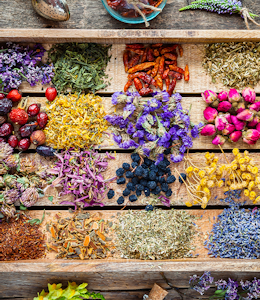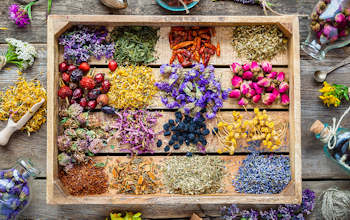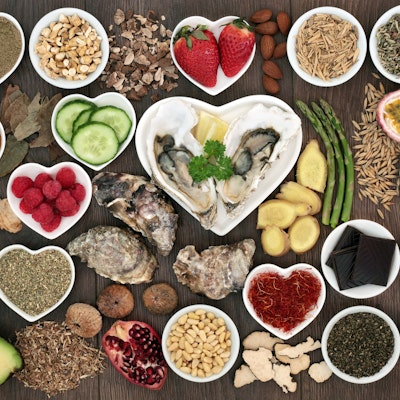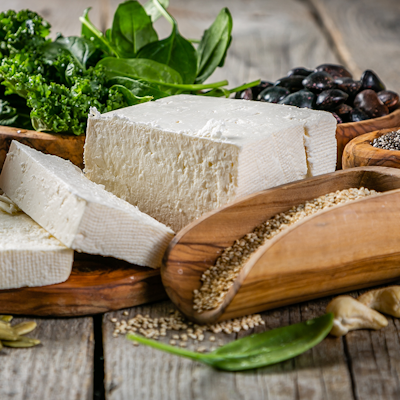The 4 Ks - food and drink for gut health
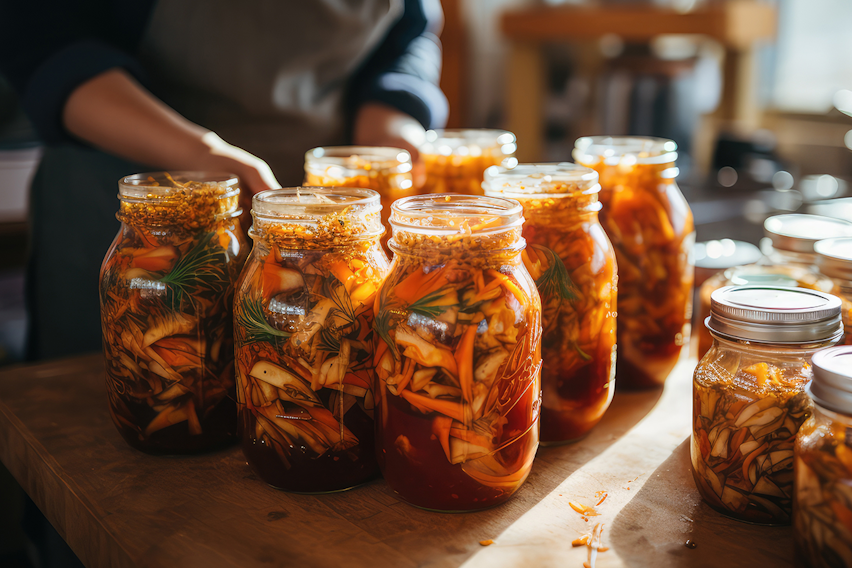
The four K foods are a list of healthy fermented foods beginning with the letter K and endorsed by professor, epidemologist and author of The Diet Myth and Spoon Fed, Tim Spector. These foods are excellent for gut health, which in turn affects how well the foods you eat are broken down and their nutrients absorbed by the body.
The 4 K foods are:
- Kefir
- Kimchi
- Kombucha
- Kraut (Sauerkraut)
Now let’s find out more about them...
Kefir
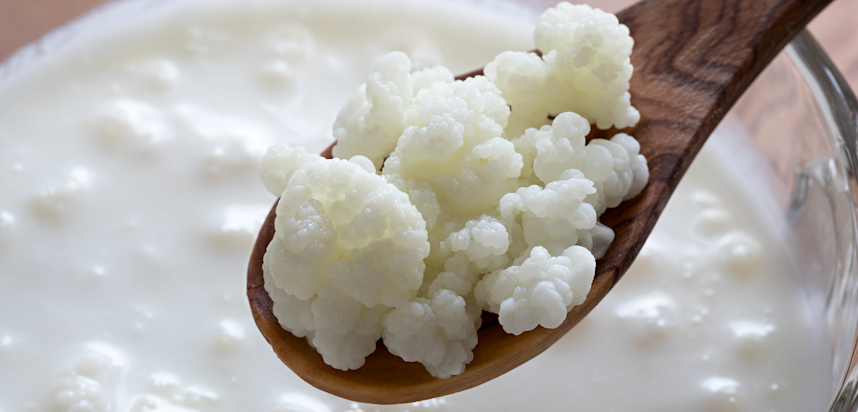
You may also be interested in…
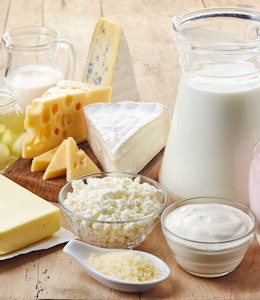
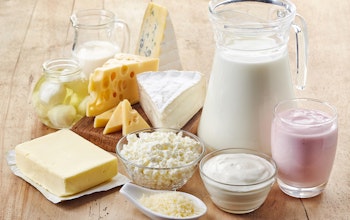
You may also be interested in…
Lactose intolerance - everything you need to know
ReadWhat is kefir?
Kefir is a fermented drink in which the main ingredient is kefir grains, which are “living mesophilic symbiotic colonies of yeast and bacteria”. The drink is typically made by inoculating milk (usually cow) with the kefir grains to create a probiotic beverage with a similar consistency and texture to yoghurt, but it can also be made with water and kefir grains.
Why is kefir good for you?
Because it contains many “good” bacteria, kefir is thought to improve gut health - more so than yoghurt (and it is also a better option than yoghurt for those with lactose intolerance). It is also thought that the microorganisms in kefir aid digestion.
There have been links to kefir helping to reduce the risk of heart disease and associated conditions such as high blood pressure and cholesterol.
How do you drink kefir?
Kefir is consumed as a beverage or a yoghurt-type liquid that can be eaten alongside fruit or granola. Water-based kefir is often flavoured and served as a carbonated drink.
What are probiotic foods?
Probiotic foods are foods rich in probiotics, a type of live bacteria that offers many health benefits to the body.
The most common benefit is gut health, along with a reduction of digestive or gastrointestinal issues, but probiotics are also thought to aid the immune system, reduce inflammation and lower the probability of heart disease, arthritis, depression and even some types of cancer.
Fermented foods and drinks such as kefir, sauerkraut, kimchi and kombucha are all famed for their probiotic qualities.
Other fermented or lightly fermented foods include yoghurt, pickles, sourdough bread, miso and some varieties of cheese.
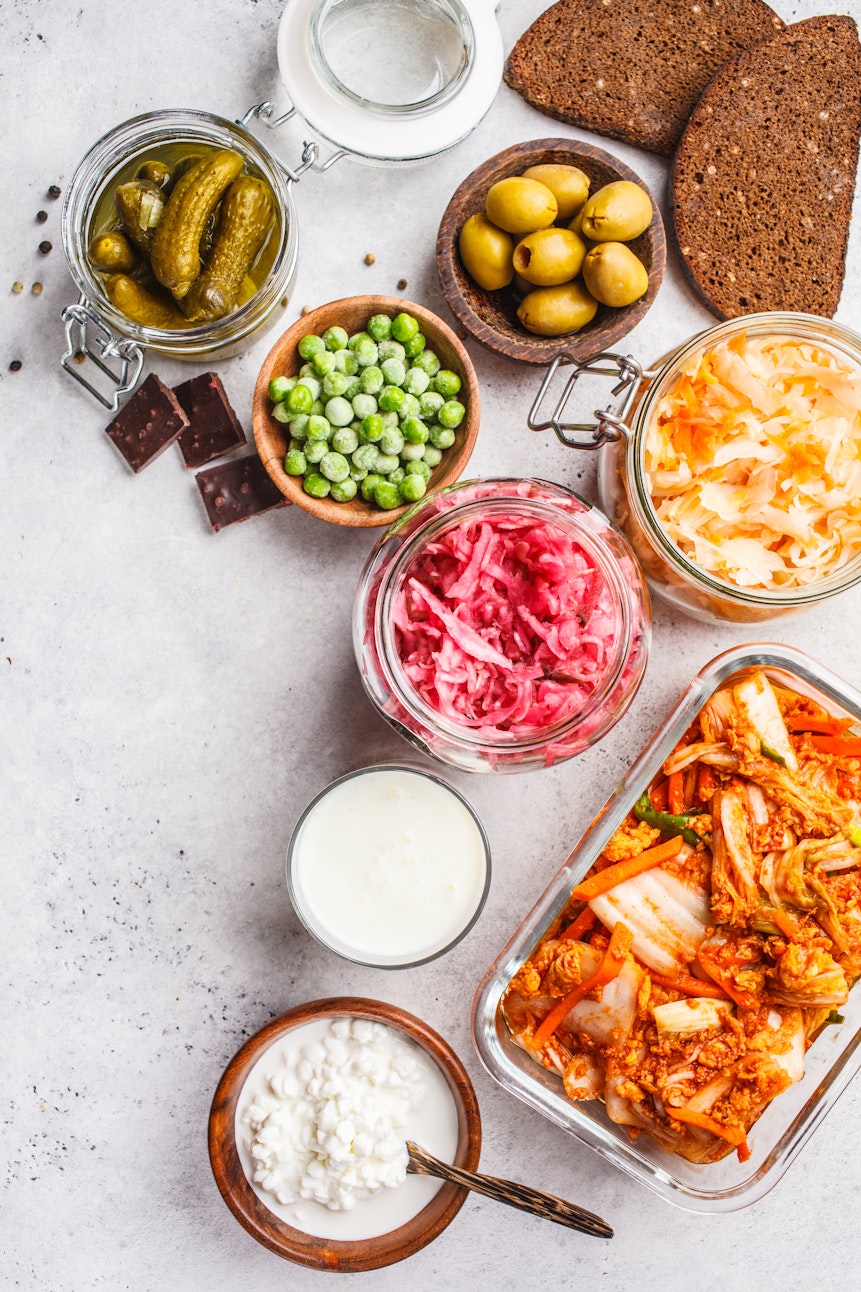
Kimchi
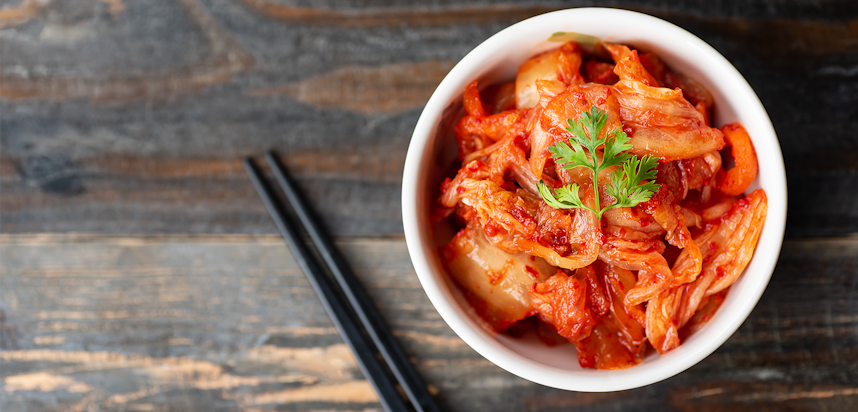
What is kimchi?
Kimchi is a fermented side dish traditional to Korea. Its main ingredient is usually either or both of napa cabbage or Korean radish, which is salted and fermented and seasoned with further ingredients such as onions, ginger, Korean chillies, dried shrimp, garlic, soy sauce or fish sauce. Kimchi has a layered flavour profile, with sourness, unami and spice all present.
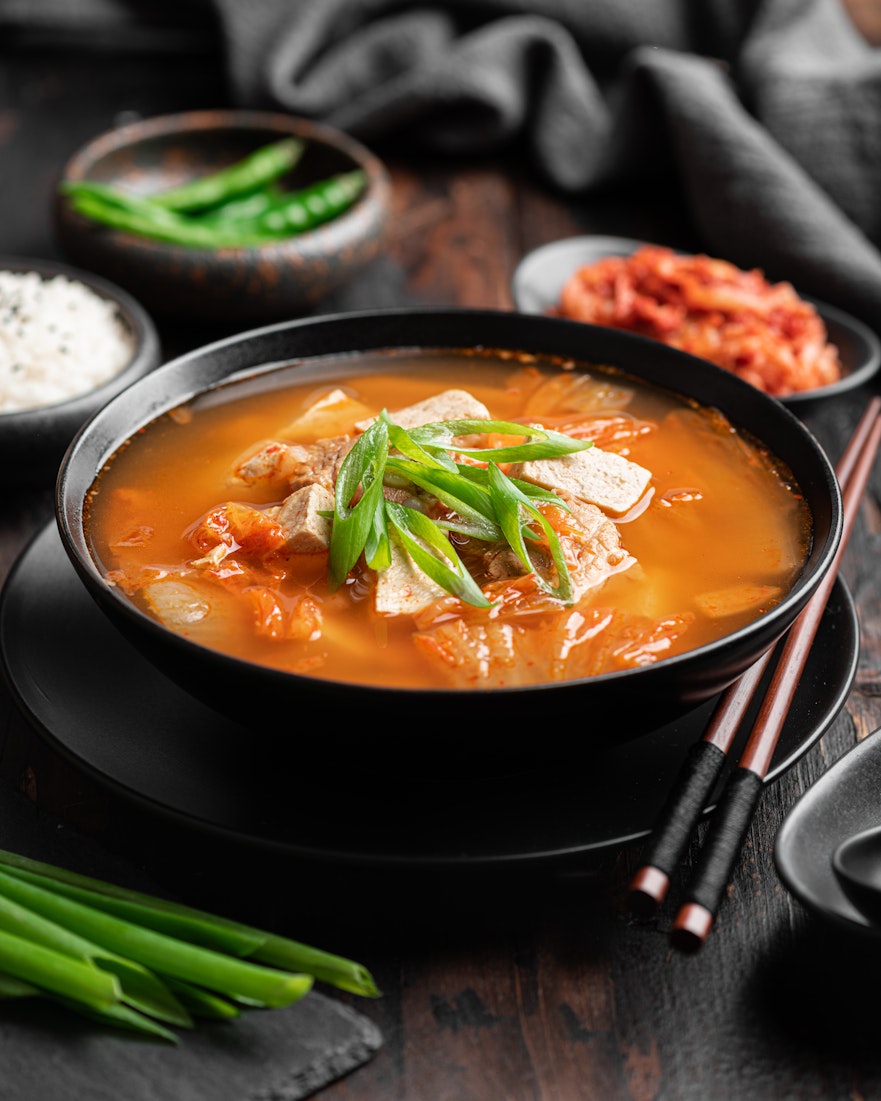
Why is kimchi good for you?
As a fermented food, kimchi is a prebiotic and as such boasts many health benefits, primarily among them reducing inflammation in the body, improving gut health and digestion, and regulating the immune system. As a low calorie food kimchi is also good for weight management, and the antioxidant compounds in it (such as beta-carotene) are thought to lower the risk of diabetes, heart diseases and even cancer.
How do you eat kimchi?
Kimchi is an extremely versatile food that is traditionally served as a side dish, but can also be added to soups, sauces or stews and combined with rice.
Are the 4K foods vegan?
Most kimchi, including traditional kimchi, is not vegan - counting seafood paste, dried shrimp or soy sauce among the ingredients. Conversely, traditional sauerkraut is suitable for vegans, as it is made using only salt and raw cabbage.
Whilst most kombucha is totally vegan, kefir is not - it is usually made by fermenting cow or goat milk. Kefir made with water or a plant-based milk can be suitable for vegans, so it is always best to check the label.
Kombucha
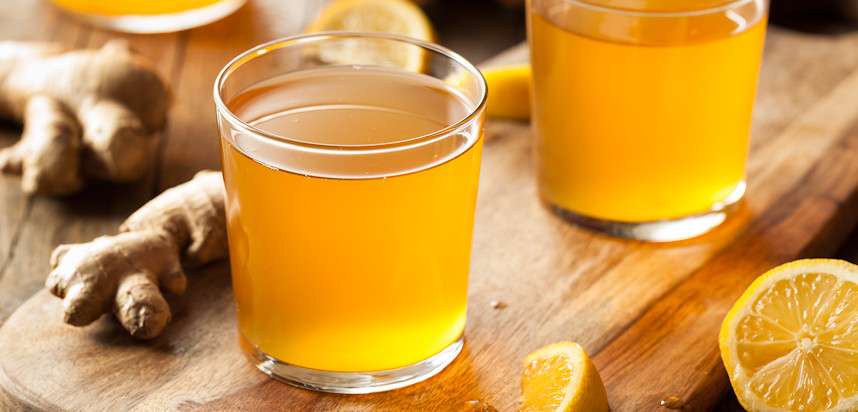
What is kombucha?
Kombucha is a low-calorie, tea-based, fermented drink dating back to ancient China. It is made with tea, sugar and a combination of bacteria and yeast, and has a light, natural fizziness and an underlying vinegary taste. It is often flavoured with fruit juice and/or spices.
You may also be interested in…
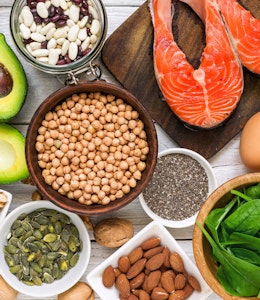
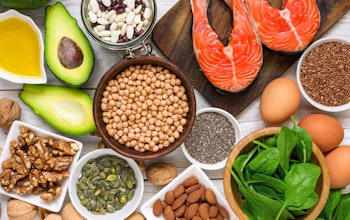
You may also be interested in…
Fighting Cholesterol in Foodservice
ReadWhy is kombucha good for you?
Like other fermented food and drinks, kombucha is probiotic and good for gut health, and a natural aid to issues such as digestive issues, irritable bowel syndrome and diarrhoea.
As a tea-derivative product, kombucha is also rich in polyphenols and antioxidants, which fight free radicals in the body and help reduce the risk of heart disease and high cholesterol.
How do you drink kombucha?
Kombucha can be drunk flavoured or unflavoured (in which case the vinegar taste is more pronounced). Lemon, ginger and plum are among the most popular flavours for kombucha, and it is usually sold in cans or glass bottles.
Do the 4K foods contain any allergens?
In terms of the 14 major food allergens only kombucha is thought to be allergen-free if made traditionally. Whilst cabbage and salt are not among the major allergens, those with a Mustard allergy may wish to be careful with sauerkraut, as cabbage can be a source of cross-reactivity.
Kimchi is made using either dried shrimp, fish paste or soy sauce, making it potentially unsuitable for those with an allergy to Crustaceans, Fish and/or Soya.
The yoghurt-type of kefir is usually made with cow Milk, another of the 14 major food allergens.
Kraut (Sauerkraut)
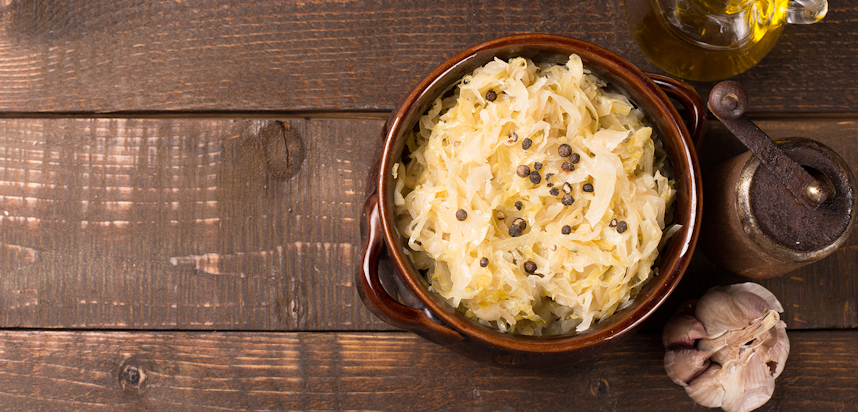
What is (sauer)kraut?
Sauerkraut (abbreviated to “kraut” for the sake of the the 4 K foods), is a dish made by fermenting finely sliced raw cabbage - hence the name, which translated from German to English is “sour cabbage”.
It is made by salting the cabbage and expelling the air around it, leaving it to ferment in its own brine. This produces an earthy, sour flavour.
Why is (sauer)kraut good for you?
A low-calorie food rich in vitamins and minerals such vitamin K, vitamin B6, vitamin K2, thiamin, riboflavin, and folate, sauerkraut can be used for weight maintenance and to boost your fibre intake for the day.
As a prebiotic food, sauerkraut also boots gut health, aids digestion and the immune system, and can reduce the risk of heart disease.
It’s worth mentioning that fresh sauerkraut is best, as tinned sauerkraut is often pasteurised, which removes some of its prebiotic content.
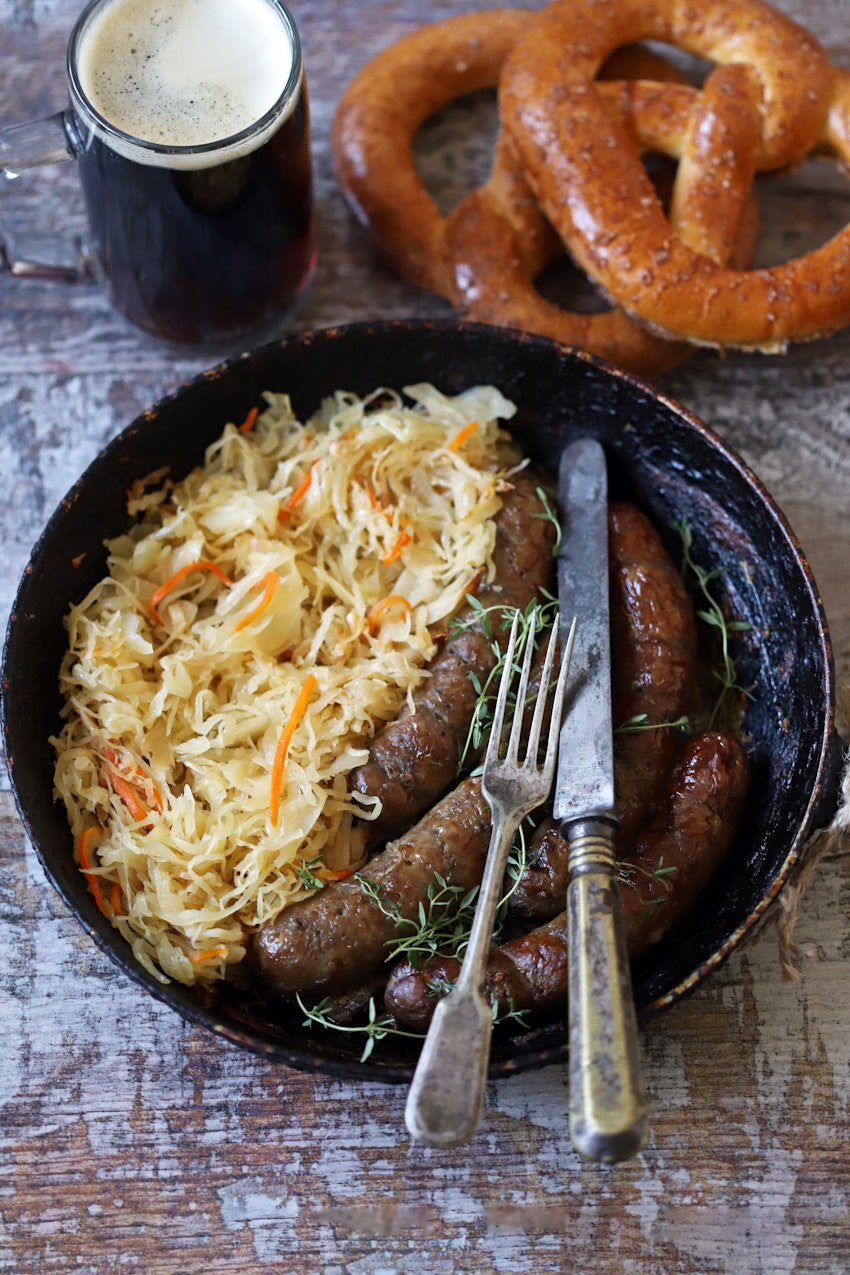
How do you eat or drink (sauer)kraut?
In traditional German cuisine warm or cold sauerkraut is usually served with meat and mashed potatoes, but it is also sometimes eaten alongside smoked fish or added to soups and stews. It can be eaten alone but is frequently used as a side dish in place of salad or coleslaw. On occasion people might drink the brine the sauerkraut was fermented in.
Who should not eat 4K foods?
You may also be interested in…
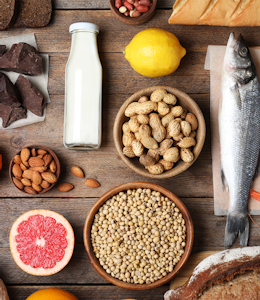
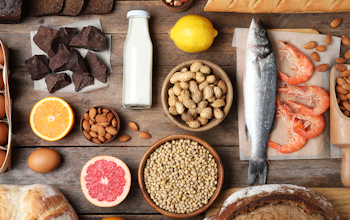
You may also be interested in…
What’s the Difference Between Allergy and Intolerance?
ReadVegans should avoid traditional kimchi and kefir, but can eat and drink kombucha and sauerkraut.
Those with a Milk allergy, milk intolerance or strong lactose intolerance should check the label of kefir carefully as many, but not all, varieties of kefir are unsuitable for them.
Those with a Fish or Crustacean allergy or intolerance should check the ingredients of kimchi before consuming.
It has also been advised that those with a weaker or weakened immune system should avoid fermented foods, as on occasion they might contain harmful bacteria in addition to the “good” probiotics.
The risk is that a probiotic product might contain a harmful type of microbe along with the helpful types.
You may also be interested in…
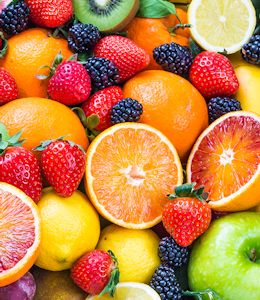
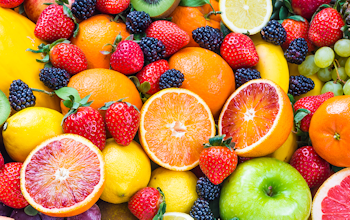
You may also be interested in…
